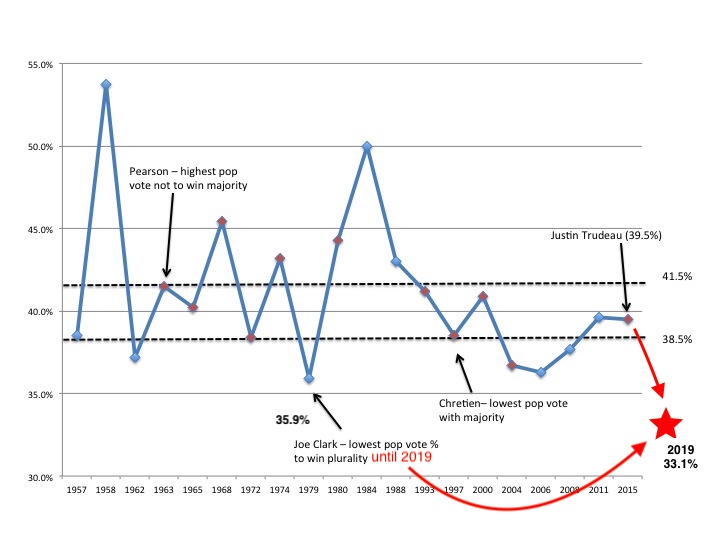It’s not uncommon in Canada to have a party with the most seats have fewer votes than another party. But the 2019 election will be the first time the governing party was elected with less than 34% of the popular vote. Justin Trudeau’s 33.1% is the new low, falling beneath John A. Macdonald’s 34.8% from Canada’s first post-Confederation election in 1867.
Justin Trudeau’s minority win is much lower than other minority wins we have seen over the past sixty years. Joe Clark’s government came to power in 1979 after winning a plurality of seats with 35.9% of the popular vote, over 4% lower than Pierre Trudeau’s Liberals.

Aside from Justin Trudeau and Joe Clark, other prime ministers and parties that had more seats, but fewer votes:
- 1896 – Wilfred Laurier Liberals lost popular vote by 7 points to Charles Tupper’s Conservatives
- 1926 – William Lyon MacKenzie King’s Liberals lost popular vote 43% to 45% for Arthur Meighen’s Conservatives
- 1957 – John Diefenbaker’s Progressive Conservatives had 39% compared to Louis St. Laurent’s Liberals 41%
Then there is MacKenzie King who had fewer votes and fewer seats in 1925, but continued to govern thanks to the Progressives which held the balance of power. That could have happened following October 21st had Scheer won more seats, but fallen short of a majority.
So, that’s where the Trudeau Liberal win on October 21st fits in the context of Canada’s electoral and parliamentary history. It’s not a majority and it’s underwhelming in terms of popular support. With the lowest popular vote since Confederation to form government, the Trudeau Liberals can reflect on how it approaches governing where two-thirds of the electorate voted for other parties.